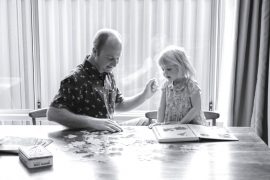By Megan Stonelake
In my work with families as a therapist, I’ve encountered an abundance of defensiveness. Parents often feel the need to vociferously defend their parenting choices. They do so subconsciously with no awareness of the emotions driving their reaction. There are a few common reasons why we get defensive about our parenting, and knowing them helps us to remain open and flexible.
1. We’re Parenting on Autopilot
Parents are defensive about their choices when they have no idea why they made them. How much thought do most of us put into how we intend to raise our children? When I was pregnant with my son, I spent hours reading about pregnancy and childbirth. It was only after he was born that I realized I hadn’t read a single book about infant care or parenting. We make intentional decisions about so many aspects of our lives, but most of us choose to parent on autopilot. We content ourselves with parenting the way we were raised, whether it was healthy and effective or not. What if we thought critically about the values we intend to impart? What if we approached parenting like any other passion we pursue: with verve, purpose, and humility?
2. We View Our Children as an Extension of Ourselves
As Dr. Shefali Tsabary astutely observes, “Many of us fall into the trap of allowing our sense of worth to become entangled with our children’s behavior.” When my son was a toddler, I took personal responsibility every time he yanked a toy out of another kid’s hands. Typical toddler behavior became proof that I was failing as a parent. Any suggestion for how to address this behavior was met with defensiveness since it was obviously a critique of my ability to parent effectively.
Our kids are whole, complete beings separate from us. They are their own people with their own ideas and their own desires. Sometimes we’ll be proud of their choices, and sometimes we’ll be disappointed in them. Regardless, it isn’t our job to mold them into the people we think they should be. Assuming their choices are a reflection of us as people will only lead to conflict.
3. We Feel a Lack of Control
Often we think something is being done to us rather than our life being a series of moments in which we make decisions, whether consciously or unconsciously. For example, I have worked with several women who chose to formula feed for a variety of reasons. One mama chose to formula feed because she was a single mum who worked full time and had twin baby boys along with an older special needs child. She knew she would be spending up to 13 hours a day away from her babies, and she decided formula feeding was the best choice for her family given these many factors. She made this decision intentionally and never felt the need to apologize for it.











